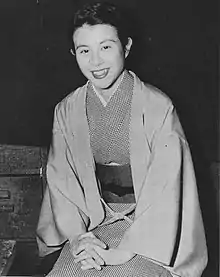Yoshiko Kuga
Yoshiko Kuga (久我 美子, Kuga Yoshiko, born 21 January 1931) is a Japanese actress.
Yoshiko Kuga | |
|---|---|
久我 美子 | |
 Kuga in 1953 | |
| Born | Yoshiko Onoda[1] January 21, 1931 Tokyo, Japan |
| Nationality | Japanese |
| Occupation | Actress |
| Years active | 1947–2000 |
| Spouse(s) | Akihiko Hirata (1961–1984) |
Biography and personal life
Kuga was born in Tokyo, Japan. Her father, Michiaki Koga (久我通顕), was a marquis and a member of the House of Peers.[2]
In 1946, while still attending Gakushuin Junior High School, she became an actress for Toho studios.[1] In June 1946, Toho had sponsored a search for "new faces", choosing Kuga as one of 48 new actresses and actors from 4,000 applicants.[3] In 1947, she made her debut as one of the lead actresses in the omnibus movie Four Love Stories (四つの恋の物語, Yottsu no Koi no Monogatari). She was one of the actors active in the 1948 union strike at Toho studios.[3] In the 1950s, she started working independently and starred in many productions of the Shochiku studios under the direction of Keisuke Kinoshita. Other important directors include Kenji Mizoguchi (The Woman in the Rumor), Yasujirō Ozu (Equinox Flower), and Tadashi Imai (An Inlet of Muddy Water). In 1954, she co-founded the film production company Ninjin Club (Bungei purodakushon ninjin kurabu) with actresses Keiko Kishi and Ineko Arima to enable better working conditions for actors within the studio system.[4] Since the 1970s, she appeared mainly on television and on stage.[5]
Kuga was married to actor Akihiko Hirata from 1961 until his death in 1984.
Selected filmography
- 1948: Drunken Angel (dir. Akira Kurosawa)
- 1950: Until We Meet Again (dir. Tadashi Imai)
- 1951: The Idiot (dir. Akira Kurosawa)
- 1953: Older Brother, Younger Sister (dir. Mikio Naruse)
- 1953: An Inlet of Muddy Water (dir. Tadashi Imai)
- 1953: Love Letter (dir. Kinuyo Tanaka)
- 1954: The Woman in the Rumor (dir. Kenji Mizoguchi)
- 1954: The Garden of Women (dir. Keisuke Kinoshita)
- 1956: The Rose on His Arm (dir. Keisuke Kinoshita)
- 1956: Farewell to Dream (dir. Keisuke Kinoshita)
- 1957: Yellow Crow (dir. Heinosuke Gosho)
- 1957: Elegy of the North (dir. Heinosuke Gosho)
- 1958: Equinox Flower (dir. Yasujirō Ozu)
- 1959: The Snow Flurry (dir. Keisuke Kinoshita)
- 1959: Good Morning (dir. Yasujirō Ozu)
- 1960: Cruel Story of Youth (dir. Nagisa Ōshima)
- 1961: Zero Focus (dir. Yoshitarô Nomura)
- 1961: The Story of Osaka Castle (dir. Hiroshi Inagaki)
- 1989: Godzilla vs. Biollante (dir. Kazuki Ohmori) (cameo)
- 1997: Toki o Kakeru Shōjo (dir. Haruki Kadokawa)
Awards
- 1954: Mainichi Film Award for Best Supporting Actress
- 1956: Blue Ribbon Award for Best Supporting Actress
- 1994: Kinuyo Tanaka Memorial Award at Mainichi Film Awards
- 1995: The Golden Glory Award
References
- "久我美子 (Yoshiko Kuga)". kotobank.jp (in Japanese). Retrieved 5 February 2021.
- 霞会館華族家系大成編輯委員会, ed. (September 1996). 平成新修旧華族家系大成 (Heisei Shinshu Former Chinese Family Taisei) (in Japanese). Volume 1. Tokyo: Kasumi Kaikan. p. 588. ISBN 978-4-64203670-2. Retrieved November 21, 2018.
- Hirano, Kyoko (1992). Mr. Smith Goes to Tokyo: Japanese Cinema Under the American Occupation, 1945–1952. Washington and London: Smithsonian Institution Press. ISBN 1-56098-157-1.
- González-López, Irene; Smith, Michael, eds. (2018). Tanaka Kinuyo: Nation, Stardom and Female Subjectivity. Edinburgh: Edinburgh University Press. ISBN 978-1-4744-0969-8.
- "久我美子 女優 (Yoshiko Kuga, actress)". NHK (in Japanese). Retrieved 5 February 2021.
External links
| Wikimedia Commons has media related to Yoshiko Kuga. |
- Yoshiko Kuga at IMDb
- Yoshiko Kuga at the Japanese Movie Database (in Japanese)